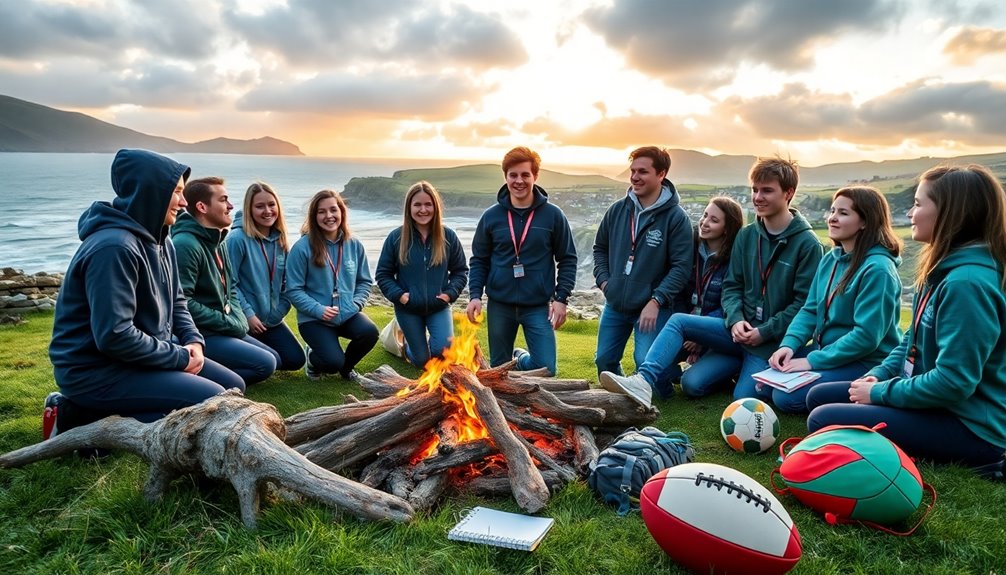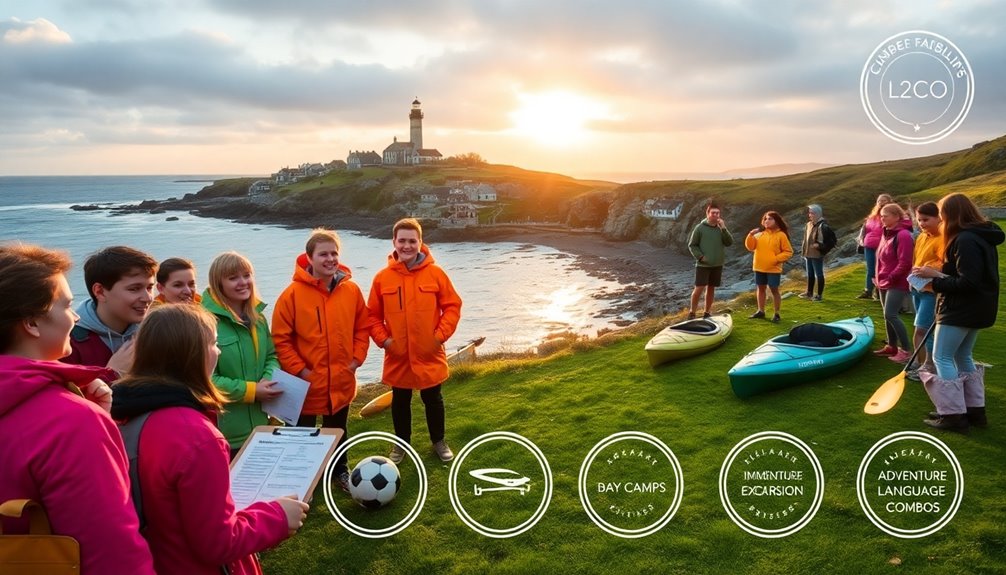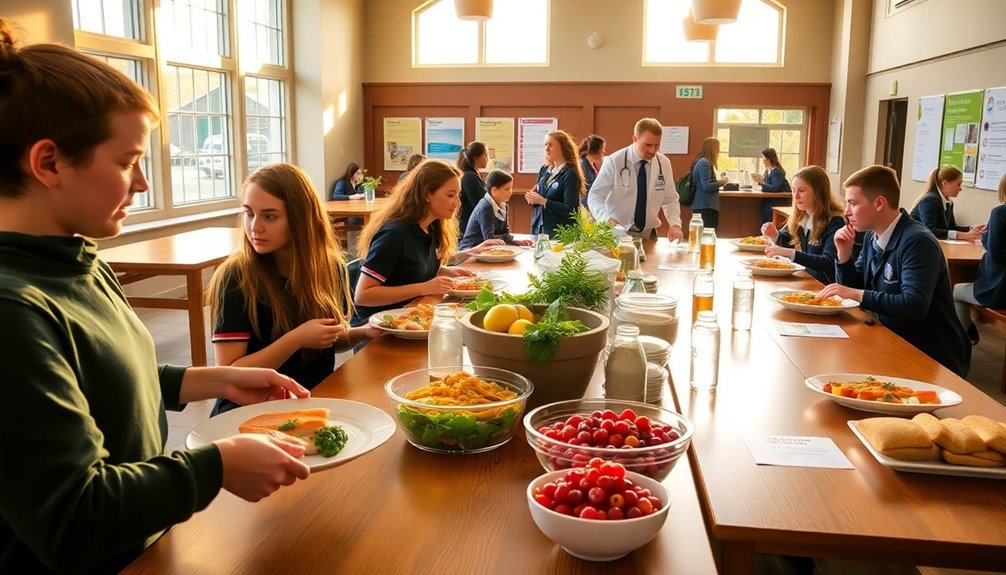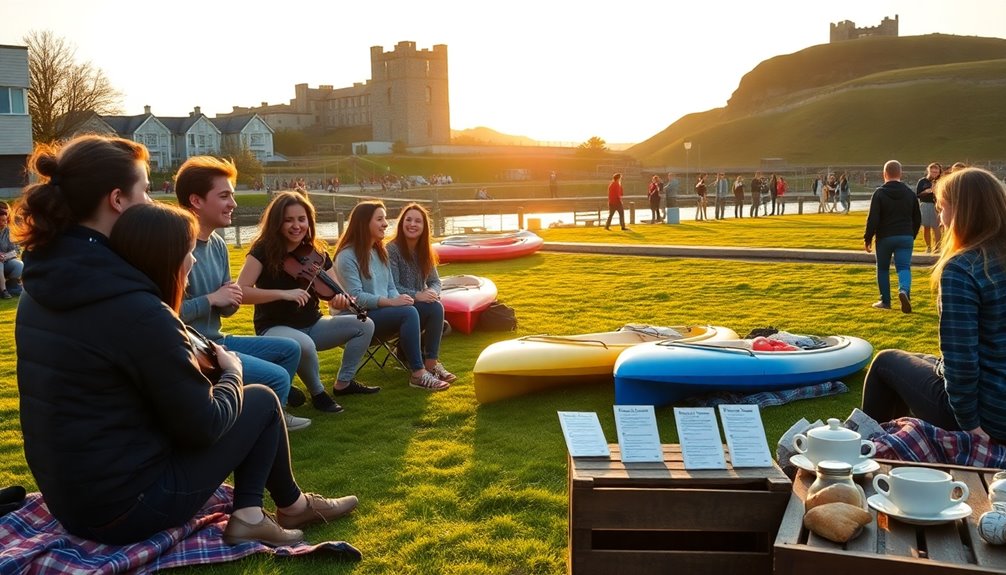
If you’re looking for teen summer language programs in Ireland, you’ll find immersive English courses that pair classroom learning with real-life practice in cafés, markets and cultural sites. Options include homestays, campus residences, short intensives and volunteer placements, usually lasting one to eight weeks with 15–25 contact hours weekly. Programs add supervised social activities, excursions and trained staff on call 24/7. Costs vary by length and accommodation, and more details on cities, schedules and safety follow.
Highlights
- Teen summer language programs in Ireland combine daily English lessons with real-life practice in cafés, markets, and community activities.
- Programs run from one to eight weeks, offering 15–25 weekly contact hours in morning, split-day, or evening formats.
- Accommodation options include supervised homestays, campus dorms, and meal plans tailored to dietary needs.
- Cities like Dublin (urban immersion) and Galway (coastal cultural experience) offer distinct cultural and extracurricular activities.
- Safety measures include 24/7 staff, orientation and curfews, trained youth-safeguarding staff, and clear incident reporting.
Why Choose Ireland for a Teen Summer Language Program
Because Ireland combines immersive English environments with a safe, teen-friendly culture, it’s an ideal choice for a summer language program. You’ll explore how cultural immersion speeds language acquisition while keeping independence and security balanced. You can test classroom learning against real-life conversation in cafés, markets, and youth centers. You’ll assess program structure, homestays, and activity mixes to see which boosts confidence and fluency. You’ll weigh supervision levels so you can roam responsibly. Practical outcomes matter: measurable progress, social growth, and stories you’ll own. Choose a program that matches your freedom goals and learning ambitions precisely.
Top Cities Hosting Teen Language Courses
You’ll want to compare Dublin’s urban immersion with Galway’s coastal cultural experience to see which setting fits your learning goals. Dublin offers city-based language practice, museums, and bustling social scenes that boost everyday English. Galway gives a smaller, artsy atmosphere with seaside activities and traditional music that shape a different kind of cultural fluency.
Dublin: Urban Immersion
When you pick Dublin for a teen summer language program, you’re choosing a compact, highly walkable city where everyday life becomes the classroom: market stalls, tram rides, and historic neighborhoods all provide constant chances to practice English. You’ll test vocabulary during urban exploration, hopping from cafés to galleries, negotiating menus and directions. Programs balance structured lessons with guided outings so you can probe real conversations and local rhythms. Cultural exchange happens naturally — host families, peers, and street encounters push you to adapt and express yourself. If you want independence while learning, Dublin gives focused practice without sacrificing freedom.
Galway: Coastal Cultural Experience
Move a couple of hours west and the pace changes — Galway offers a coastal language experience where the sea, music, and local accents shape how you’ll use English. You’ll test phrases in cafés, on cliffs, and at trad sessions, learning idioms faster than in a classroom. Programs blend structured lessons with coastal adventures: surfing, island trips, and market bargaining that force quick thinking. Cultural immersion goes beyond tours — you’ll live with hosts, join community projects, and pick up regional rhythm and wit. If you crave autonomy while improving fluency, Galway hands you practical skills in a lively, open setting.
Types of Programs Available for Teenagers

There are several distinct program types teens can choose from, each geared to different goals and comfort levels: immersive homestay courses for rapid language gain, campus-based residential programs that mix classes with extracurriculars, short intensive workshops focused on exam prep or conversation, volunteer or work-shadow placements for practical use, and tailored small-group or one-to-one tuition for targeted skill-building. You’ll find language immersion options that double as cultural exchange, letting you live local routines and test your skills in real situations. Compare structure, supervision, activity variety, and independence level so you choose a program that fits your appetite for freedom.
Typical Course Lengths and Schedules
Although programs can range widely, most teen language courses in Ireland fall into a few common lengths and daily rhythms that you’ll want to compare before deciding. You’ll typically find one- to four-week intensives, and longer six- to eight-week summer stays if you want deeper immersion. Course formats vary: morning lessons with afternoons free for activities, split days mixing grammar and conversation, or condensed evening classes. Class schedules often run 15–25 contact hours weekly, with optional excursions or homestay time that extend informal practice. Check weekly rhythms, start dates, and flexibility so you can shape learning around your summer plans.
Accredited Schools and Program Providers
When you’re choosing a summer program, accredited schools and vetted providers give you measurable quality and consumer protection, so it’s worth checking their credentials before you book. You’ll want to verify program accreditation from recognised bodies and confirm that accredited institutions follow safety, teaching and welfare standards. Look for clear refund policies, staff DBS checks, and curriculum oversight. Compare providers’ claims against independent registries and read inspection reports. Ask direct questions about teacher qualifications, student-to-teacher ratios, and complaint procedures. That investigative step keeps your options open and guarantees the freedom to choose a programme that truly meets your goals.
Accommodation Options for Teen Students
Choosing the right accommodation can make or break your teen’s experience, so you’ll want to weigh safety, independence, and cultural immersion before you book. You’ll explore homestay families for close cultural practice and supervised independence; check family references, curfew rules, and host proximity to classes. Alternatively, dormitory options often offer peer social life, communal supervision, and structured activities—verify rooming policies, staff presence, and security. Ask about laundry, internet, and transport links so your teen can move freely without surprises. Inspect cancellation terms and emergency contacts, and balance autonomy with safeguards that let them grow confidently.
Meals, Dietary Needs, and Student Welfare

You’ll want to know how meal plans are structured and whether meal times fit around classes and activities. Ask how the program handles allergies, intolerances, and religious or ethical restrictions, and what documentation or medical info they’ll need. Also check what on-site staff or host families do to monitor students’ welfare around food and health.
Meal Plans & Scheduling
Although meals are often taken for granted, clear meal plans and scheduling are central to student welfare and smooth program operations. You’ll want to know meal options offered, how meals fit the day, and whether schedules let you explore independently. Investigate meal times, buffet versus plated service, and downtime between lessons and activities. Ask if scheduling flexibility accommodates excursions, late arrivals, or personal routines. Check whether communal dining fosters socializing or if quieter alternatives exist. Demand transparent daily menus and timing so you can plan free hours confidently, balancing nourishment, language practice, and the freedom to choose your own rhythm.
Dietary Restrictions & Care
1 key question about any teen program is how it handles dietary restrictions and ongoing care. You’ll want clear nutritional guidelines that meet diverse needs—vegan, halal, gluten-free—and flexible meal options so you’re not boxed in. Check how staff document allergies, emergency plans, and training in allergy awareness; ask about cross-contact prevention and medication protocols. Look for routine welfare checks, easy communication with health staff, and parental access to logs. A program that respects autonomy will let you make informed choices while keeping safety first, balancing freedom with structured safeguards for your health and peace of mind.
Local Transport and Getting Around as a Teen
When you’re getting around town, knowing the main transport options, costs, and safety tips will save you time and money. You’ll check public transport schedules — buses, trains, and trams — and compare student fares or travel cards. Map sensible walking routes between host family, school, and town; walking’s free and lets you explore. Consider bike rentals for short trips, and use apps for real-time updates. Stick to well-lit streets at night, travel with friends when possible, and keep emergency numbers handy. Ask program coordinators about supervised transfers and approved taxi services to maintain independence without unnecessary risk.
Cultural and Social Activities Included

Because you’ll want more than classroom learning, the program mixes cultural outings and social events that help you practice language and meet people. You’ll join cultural excursions to museums, historic sites, music sessions and local markets, testing vocabulary in real contexts. Evening mixers, group dinners and sports nights promote social integration so you can choose how much to engage. Optional workshops — film, dance, storytelling — deepen cultural understanding while keeping freedom of movement and choice. Staff outline schedules but encourage independent exploration nearby. You’ll leave with conversational confidence, local contacts, and a clearer sense of how to navigate culture on your own.
Safety, Supervision, and Emergency Support
While you’ll have freedom to explore, the program pairs that independence with clear supervision rules, dedicated staff on duty 24/7, and a structured check-in system so you always know whom to contact and where to go. You’ll get an orientation covering safety protocols, curfew expectations, and buddy systems for outings. Dorm and host-family monitoring is regular but respectful, letting you move within agreed boundaries. Staff are trained in first aid and youth safeguarding, with local emergency contacts provided and accessible. Incident reporting is transparent; follow-up and parental notifications are standard. You’ll feel supported without losing your sense of adventure.
Estimated Costs and What’s Included
You’ll want to compare program tuition fees to see what core instruction and materials are covered. Check whether accommodation and meals are included or listed as separate charges. Also ask about extra activity costs so there aren’t surprise fees for excursions or evening programs.
Program Tuition Fees
Tuition for teen summer language programs in Ireland typically ranges from about €900 to €3,500 depending on session length, accommodation type, and included activities, so it’s important to break down what’s actually covered. You’ll get a clear tuition breakdown from reputable providers: course hours, teaching materials, local excursions, and some social events are usually included; airport transfers or special workshops may cost extra. Ask which fees are mandatory versus optional. Look into financial aid, scholarships, and early-bird discounts to widen your options. If you value independence, compare itemized invoices so you’re not surprised by hidden charges.
Accommodation and Meals
After you’ve compared tuition line items, the next big cost to examine is where students live and eat—these often change the overall price more than course hours do. You’ll weigh accommodation types: host family stays, student residences, and shared apartments—each shifts cost and independence. Host families include meals; residences may offer self-catered kitchens or cafeteria plans. Check what’s included: number of meals, laundry, Wi‑Fi, and security. Estimated costs vary widely, so request itemized quotes. If you want freedom, favor self-catered or apartment options; if you want immersion, choose host families with meal options spelled out clearly.
Extra Activity Costs
While program fees usually cover classes and basic supervision, extra activities can add a significant slice to your budget, so ask for an itemized list of excursions, cultural events, and weekend trips. You’ll want clear estimates for extra activity fees — museum entries, guided hikes, surf lessons or transport — and whether deposits are refundable. Check what’s included: equipment, meals, entrance fees, and supervision. Optional excursions often carry separate charges and may be limited by group size. Ask if discounts apply for multiple trips, what payment methods are accepted, and how changes or cancellations are handled to protect your freedom.
Pre-departure Essentials and Packing Checklist
Packing smart will save you time, money, and stress before you leave for Ireland. You’ll want a concise pre departure checklist: passport, visa documents, travel insurance, emergency contacts, medication list, and copies of reservations. Research baggage limits and local climate so your packing essentials match reality—waterproof jacket, layered clothing, comfortable shoes, portable charger, and a small first-aid kit. Limit valuables; bring a lockable daypack and a slim wallet. Notify banks, download maps and language apps, and confirm host or program pickup details. Double-check electrical adapters and photocopy important papers. Leave room to bring back memories.
Some Questions Answered
Can Teens Earn School Credit From These Summer Language Programs?
Yes — you can often earn school credit if the program’s accreditation matches your school’s requirements. You’ll want to investigate whether the provider offers accredited courses, approved syllabi, and official transcripts. Check with your guidance counselor about transfer policies, required contact hours, and assessment methods. If accreditation aligns and paperwork’s completed, the experience can count toward graduation or language electives, while still giving you freedom to explore and learn abroad.
Are Language Proficiency Tests Administered at the Program’s End?
Yes — you’ll usually face a final check like a breeze testing sails. Programs often include language assessment methods such as oral interviews, written exams and practical tasks, with proficiency evaluation criteria tied to fluency, accuracy and comprehension. You’ll get clear feedback and sometimes a formal certificate or CEFR-aligned level. It’s investigative and freeing: you’ll see exactly where you stand and what skills to steer toward next.
Do Programs Offer Sibling or Group Discounts for Families?
Yes — many programs offer sibling and group discounts, letting you secure savings opportunities through family packages and multi-student rates. You’ll find reduced tuition for siblings, friends who enroll together, or families booking consecutive sessions. Ask coordinators about minimum group sizes, deposit rules, and combined housing options to maximize savings. Compare offers, confirm eligibility, and negotiate a tailored family package that fits your desire for flexible, affordable summer learning freedom.
What Are Visa Requirements for Non-Eu Teen Participants?
Need a visa to join? You’ll follow the visa application process for non‑EU teens, and you’ll gather required documentation like passport, parental consent, proof of course enrollment, accommodation details, travel insurance, and financial evidence. You’ll usually apply through the Irish immigration site or local embassy, allow several weeks for processing, and keep copies of everything. Check specific embassy rules early so your freedom to travel isn’t delayed.
Is Travel Insurance Included or Recommended by Providers?
Yes — most providers recommend travel coverage and many include basic insurance in program details. You’ll want extensive travel insurance that covers medical emergencies, trip cancellation, luggage and activity-specific risks. Check each provider’s policy limits, exclusions and whether additional coverage is advised for adventure activities or pre-existing conditions. Insist on clear program details about what’s included, then top up privately if gaps remain so you’re free to travel confidently.
Summing Everything Up
You’ll find Ireland’s friendly accents and quiet cliffs teaching you as much as any classroom — bright, social city campuses beside windswept coastal towns. You’ll juggle structured lessons and spontaneous Irish nights, strict supervision and sudden freedom, careful safety plans and the thrill of first solo steps. Choose programs accredited and clear about costs, pack sensibly, and trust emergency support. In that tension between comfort and discovery, you’ll leave changed, more curious, more sure.
